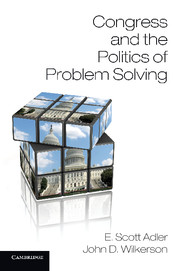Book contents
- Frontmatter
- Contents
- Tables and Figures
- Preface
- Part I
- Part II
- 4 Problem-Solving Constraints and Legislative Institutions
- 5 Agenda Scarcity, Problem Solving, and Temporary Legislation
- Part III
- Part IV
- Appendix A
- Appendix B Assignment of Bills across Issue Types
- Appendix C Calculating Committee Roll Rates
- Bibliography
- Index
- References
4 - Problem-Solving Constraints and Legislative Institutions
Published online by Cambridge University Press: 05 January 2013
- Frontmatter
- Contents
- Tables and Figures
- Preface
- Part I
- Part II
- 4 Problem-Solving Constraints and Legislative Institutions
- 5 Agenda Scarcity, Problem Solving, and Temporary Legislation
- Part III
- Part IV
- Appendix A
- Appendix B Assignment of Bills across Issue Types
- Appendix C Calculating Committee Roll Rates
- Bibliography
- Index
- References
Summary
The role of the federal government has dramatically expanded as it attempts to find solutions to the range of complex problems facing our society. In particular, the demands placed upon the legislative branch have grown to staggering proportions. Both the expanded government agenda and the complexity of the issues before our lawmakers have severely challenged the ability of the legislature to perform its functions responsibly and productively. The way the Congress structures and uses its time is of critical importance to the quantity and quality of legislation emanating from the institution.
Thomas J. O’Donnell, summarizing the findings of the 1977 Obey Commission (1981)The previous chapters offered evidence that voters expect lawmakers to address problems in society and are willing to hold them collectively accountable. Members of Congress report that they believe congressional accomplishments have implications for their own reelection prospects. Lawmakers have collective incentives to engage in problem solving because voters’ perceptions of congressional performance have demonstrable electoral consequences. How then do problem-solving incentives in the electoral arena affect organization and behavior in the legislative arena?
When it comes to addressing the many and varied problems and policy demands of voters, members of Congress rely upon the body’s primary governing institution – its committee system. This is certainly not a novel point of emphasis. Scholars and lawmakers alike draw attention to the central roles of committees in lawmaking. Scholars have portrayed the legislative work of Congress as primarily committee centered as far back as Woodrow Wilson (1981 [1885]), Lauros McConachie (1898), and George Galloway (1946), and this view still largely persists today. Longtime representative Henry Waxman (D-CA) describes the normal functioning of Congress as a “bottom-up” process where “committees with relevant expertise [write] the nation’s laws” (2010, 132).
- Type
- Chapter
- Information
- Congress and the Politics of Problem Solving , pp. 53 - 65Publisher: Cambridge University PressPrint publication year: 2013



